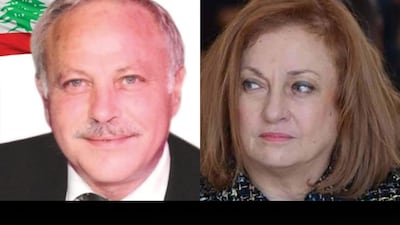Tensions between two high-profile public officials escalated to a bitter public row in Lebanon in the past week.
The rivalry between judge Ghada Aoun and the country's top prosecutor Ghassan Oueidat mirrors an ongoing dispute between two of the country's main political parties.
Ms Aoun, who is the chief prosecutor for the region of Mount Lebanon, has been at the forefront of an anti-corruption campaign since Lebanon's economic meltdown started in late 2019.
On her Facebook page, she compares herself to Italian judge Antonio Di Pietro, who became famous for investigating political corruption three decades ago.
Mr Oueidat has repeatedly stalled her investigations, as well as other inquiries into Lebanon’s crumbling financial sector, despite protests and public requests for accountability after banks implemented unofficial capital controls in November 2019.
The financial crisis has been blamed for soaring inflation and rising poverty in the country.
Meanwhile, top bankers have hinted at politicians pressuring them to discreetly funnel millions out of the country. This is not illegal because Parliament never implemented a capital control law. But most Lebanese view it as immoral.
Politicians also publicly agree that corruption is one of the main causes for the country’s economic collapse.
When facing prosecution however, many politicians take advantage of a reputation of Lebanese judges for being politicised to claim victimhood.
“This becomes the main source of impunity,” said Nizar Saghieh, the founder of local watchdog Legal Agenda.
Factionalism
Despite the worsening financial crisis, President Michel Aoun and Prime Minister-designate Saad Hariri have focused their energy for the past six months on fighting over how to allocate ministerial posts within the future Cabinet.
Mr Aoun has repeatedly attacked Mr Hariri's allies, calling for an investigation into the powerful central bank governor Riad Salameh, who has obstructed an international audit.
Ms Aoun has also focused her efforts on Mr Salameh and the banking sector, drawing criticism from Mr Hariri’s allies who accuse her of cherry picking legal cases and ignoring those that involve the president’s relatives.
Lebanese judges largely owe their nominations to politicians. They share power on a sectarian basis, a system that slows down decision making and encourages corruption.
Ms Aoun, a Maronite Christian, was appointed by presidential decree in 2017 and is reportedly close to President Aoun. They are not related.
Mr Oueidat, a Sunni Muslim, was appointed by a government decree late 2019, weeks before Mr Hariri resigned as prime minister in the face of nationwide protests.
Ms Aoun has clashed previously with Mr Oueidat, who stopped her from investigating sources of former Prime Minister Najib Mikati's wealth.
But Ms Aoun publicly defied Lebanon's top judge after he removed her on Thursday from investigating "important financial crimes".
On Friday and Saturday, Ms Aoun raided the office of Mecattaf Group, situated in a north-eastern suburb of Beirut.
This came a few days after a group of activists called "the scream of depositors" filed a lawsuit against Mr Salameh, his top aides and exchange offices including the Mecattaf group, accusing them of money laundering and illicit enrichment.
The Mecattaf Group ships banknotes and gold bars to and from Lebanon. One of its general managers, Michel Mecattaf, told local television MTV that he was “surprised by the presence of Judge Ghada Aoun” and denied any wrongdoing.
Hundreds of protesters gathered outside Mecattaf's office on Saturday afternoon while Ms Aoun was inside. Local media filmed her entering the building early afternoon in the company of men wearing uniforms of State Security, the only Lebanese security agency that reports directly to Mr Aoun.
MTV reported clashes later that evening when Ms Aoun exited the building.
Ms Aoun's actions captivated the Lebanese, with the hashtag "we are all Ghada Aoun" trending on Twitter on Saturday.
"We are here to support judge Ghada Aoun in her mission," said marketing professional Rolla Abboud, 39, a member of President Aoun's Free Patriotic Movement who was part of the crowd that had gathered outside the Mecattaf office. "We want the truth."
Other protesters said they were not politically affiliated.
Rami Ollaik, a lawyer who represents "the scream of depositors" denied that the case was politicised. "We're just concerned about the rights of the people," he told The National.
Mr Ollaik said that Mr Mecattaf had handed over the required documents to Ms Aoun by Saturday evening and that the investigation was ongoing.
The root of the problem
Both Mr Oueidat and Ms Aoun may have ulterior political motivations, but the former’s decision to remove the latter from her investigation is illegal, said Mr Saghieh.
“High level judges might have relations with political leaders, but this does not mean that they do not have a case. This does not mean that we must not fight for accountability from bankers,” said Mr Saghieh.
The solution is to campaign for the independence of the judiciary, said Mr Saghieh.
Legal Agenda has worked on a draft law that has been examined by parliament for over a year and has yet to be voted on.
“We cannot live in total impunity while we wait. This is absurd,” said Mr Saghieh.
Caretaker Justice Minister Marie-Claude Najem called an emergency meeting on Saturday with Mr Oueidat and the heads of the Supreme Judicial Council and the Judicial Inspection Authority.
"The judiciary is showing that it is incapable of fighting corruption and fights media battles" instead, she said.
“People have lost confidence in it.”















